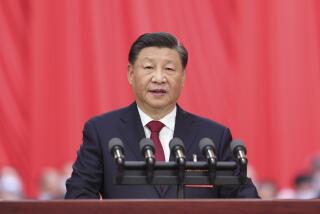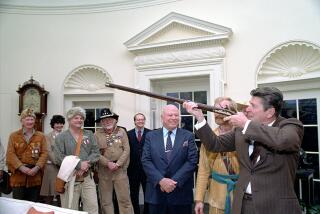A Legacy of Contrasts
- Share via
MADISON, WIS. — Deng Xiaoping, who died last week at age 92, was, by far, the most successful of modern China’s many nationalist leaders. He promoted and presided over an extraordinarily rapid process of modernization that has now made the Chinese economy the second largest in the world. History books, especially Chinese history books, will celebrate that nationalist success for many generations to come. Yet, Deng’s political career, which spanned most of the 20th century, was varied and complex and, ultimately, contradictory.
Deng began his political life as a youthful revolutionary activist, one of the youngest of a group of radical Chinese students studying in France after World War I. While still a teenager, he joined the French branch of the Chinese Communist Party. Yet, when the elderly Deng became China’s “paramount leader,” in 1979, he regarded young political activists as insufficiently grateful to their elders, and one of his first acts was to jail the youthful leaders of the first Democracy Movement of 1979-81, who had helped his own rise to power. Ten years later, in June 1989, he ordered massive military force against young Chinese students and workers in and around Tiananmen Square, earning him the title “Butcher of Beijing.”
A leading member of the Maoist ruling group after 1949, Deng was the chief witch hunter in the anti-rightist campaign of 1957-58, which dispatched more than a million intellectuals and party cadres to labor in remote areas of the countryside. But much to his credit, when he achieved power himself in the late 1970s, he released hundreds of thousands from bondage--some, no doubt, the victims of his own purges 20 years before.
Deng came to power in post-Mao China on a platform promising “socialist democracy,” offering high expectations and winning great personal popularity, especially in the cities. But he soon made a mockery of socialism, just as he did of democracy. Though he announced socialist goals and claimed a socialist legitimacy, that soon came to mean no more than stamping a “socialist” label on every policy or action, whatever its content. In the end, even in Dengist theory, “socialism” was reduced to little more than the pursuit of rapid economic development. “Slow growth is not socialism” was the paramount leader’s final pronouncement on the matter--indeed one of his last public statements on any matter, made in 1993.
Deng was the main author of the famous 1981 Resolution on Party history, which criticized Mao Tse Tung for his arbitrary personal rule; for setting himself above the party and violating Leninist norms of “democratic centralism,” and for fostering a personality cult. Yet when in power himself, Deng increasingly acted like Mao. Though he eschewed most formal titles, he collected as much real power into his own hands as Mao ever had, dismissing the two proteges he had selected to head the Communist Party (Hu Yaobang in 1987 and Zhao Ziyang in 1989), and personally intervening in party and government affairs at crucial moments and in decisive Mao-like fashion. Deng even allowed a mini-personality cult to be constructed around himself in his later years, though it did not strike many popular chords.
Deng repeatedly insisted that political reform must accompany economic reform, but by “political reform” he meant Maurice Meisner, a professor of history at the University of Wisconsin-Madison, is the author of “The Deng Xiaoping Era: An Inquiry into the Fate of Chinese Socialism 1978-1994” (Hill and Wang).
not democratic change, as many assumed for too long, but rather the more modest goal of making the communist bureaucracy modern and more efficient. While loudly announcing political reform, he retained the essentials of the Stalinist political system inherited from the Mao period. For good measure, he even attempted to revive Leninist norms of conduct and discipline to make the Stalinist system run more smoothly.
While Deng proclaimed socialist aims, his “socialist” market reforms unleashed a frenzied process of capitalist development, which Deng hastened through crucial personal interventions. It is, indeed, the most massive case of capitalist development in world history, resulting in phenomenal rates of industrial growth that will give China the world’s largest economy within a generation.
Although Deng will undoubtedly be recorded in history books as the father of Chinese capitalism--albeit a capitalism of a peculiar, bureaucratic kind--his market policies were not motivated by visions of a capitalist utopia. What did inspire Deng, and what ties together the many disparate elements of his long political career, is suggested in a comment he made about Mao soon after he had established himself as China’s dictator in 1979.
During the course of the reevaluation of Mao’s role in Chinese history, Deng insisted on a more positive evaluation than some of his colleagues wanted, reminding them that Mao had “built a country,” as he said to a foreign journalist in 1980. It was a nationalist vision of the “wealth and power” of China that was always Deng’s overriding goal.
It is thus most unlikely that Deng set out in 1979 to create a capitalist economy. Lacking evidence to the contrary, one cannot doubt the sincerity of his promise of “socialist democracy” at the time--whatever the deficiencies in his understanding of what socialism and democracy meant. What mattered were not defects in understanding but rather the simple fact that, in the world in which China found itself, Deng viewed capitalist methods as the most expedient and efficient for China’s development. At the same time, he found democracy incompatible with the “stability and unity” he believed necessary for rapid economic growth. In both cases, Deng’s judgments were made on essentially nationalist grounds, according to the criteria of whether a particular policy served the ultimate goal of the power and prosperity of the Chinese nation.
It is thus Chinese nationalism that is at the heart of the Deng’s legacy. To almost a macabre degree, Deng arranged to reach from beyond his grave to assure a nationalist “stability” in post-Deng China. First, he took three years to die, enabling his hand-picked successor, Jiang Zemin, to consolidate his power, remove potential sources of opposition and jail such dissidents as remain in the country. Second, Deng managed to combine a capitalist market economy with a Stalinist political system. Though seemingly incongruous, it may prove to be a stable combination for many years to come. For communist bureaucrats and party-state bureaucracies (including the army) are centrally involved in the workings of Chinese capitalism and derive the greatest benefits from it.
China’s rather peculiar capitalist class is not one that is likely to challenge the communist state. And this is the way Deng would have had it in his vision of a stable China, successfully searching for national wealth and power in the world.
More to Read
Sign up for Essential California
The most important California stories and recommendations in your inbox every morning.
You may occasionally receive promotional content from the Los Angeles Times.








